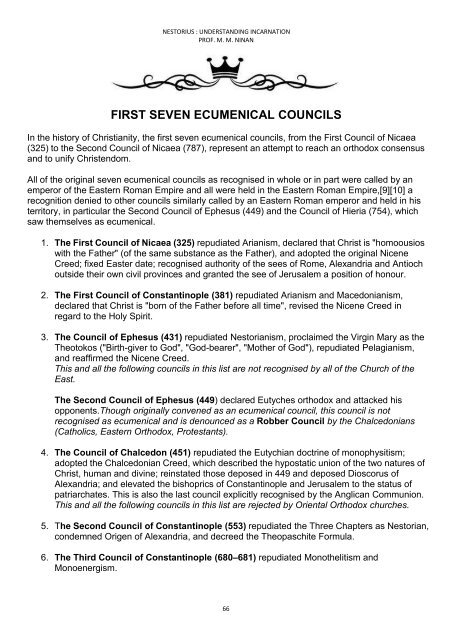Nestorius
You also want an ePaper? Increase the reach of your titles
YUMPU automatically turns print PDFs into web optimized ePapers that Google loves.
NESTORIUS : UNDERSTANDING INCARNATION<br />
PROF. M. M. NINAN<br />
FIRST SEVEN ECUMENICAL COUNCILS<br />
In the history of Christianity, the first seven ecumenical councils, from the First Council of Nicaea<br />
(325) to the Second Council of Nicaea (787), represent an attempt to reach an orthodox consensus<br />
and to unify Christendom.<br />
All of the original seven ecumenical councils as recognised in whole or in part were called by an<br />
emperor of the Eastern Roman Empire and all were held in the Eastern Roman Empire,[9][10] a<br />
recognition denied to other councils similarly called by an Eastern Roman emperor and held in his<br />
territory, in particular the Second Council of Ephesus (449) and the Council of Hieria (754), which<br />
saw themselves as ecumenical.<br />
1. The First Council of Nicaea (325) repudiated Arianism, declared that Christ is "homoousios<br />
with the Father" (of the same substance as the Father), and adopted the original Nicene<br />
Creed; fixed Easter date; recognised authority of the sees of Rome, Alexandria and Antioch<br />
outside their own civil provinces and granted the see of Jerusalem a position of honour.<br />
2. The First Council of Constantinople (381) repudiated Arianism and Macedonianism,<br />
declared that Christ is "born of the Father before all time", revised the Nicene Creed in<br />
regard to the Holy Spirit.<br />
3. The Council of Ephesus (431) repudiated Nestorianism, proclaimed the Virgin Mary as the<br />
Theotokos ("Birth-giver to God", "God-bearer", "Mother of God"), repudiated Pelagianism,<br />
and reaffirmed the Nicene Creed.<br />
This and all the following councils in this list are not recognised by all of the Church of the<br />
East.<br />
The Second Council of Ephesus (449) declared Eutyches orthodox and attacked his<br />
opponents.Though originally convened as an ecumenical council, this council is not<br />
recognised as ecumenical and is denounced as a Robber Council by the Chalcedonians<br />
(Catholics, Eastern Orthodox, Protestants).<br />
4. The Council of Chalcedon (451) repudiated the Eutychian doctrine of monophysitism;<br />
adopted the Chalcedonian Creed, which described the hypostatic union of the two natures of<br />
Christ, human and divine; reinstated those deposed in 449 and deposed Dioscorus of<br />
Alexandria; and elevated the bishoprics of Constantinople and Jerusalem to the status of<br />
patriarchates. This is also the last council explicitly recognised by the Anglican Communion.<br />
This and all the following councils in this list are rejected by Oriental Orthodox churches.<br />
5. The Second Council of Constantinople (553) repudiated the Three Chapters as Nestorian,<br />
condemned Origen of Alexandria, and decreed the Theopaschite Formula.<br />
6. The Third Council of Constantinople (680–681) repudiated Monothelitism and<br />
Monoenergism.<br />
66

















